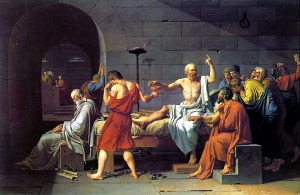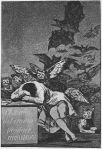Thank goodness for people like Thomas Piketty. In February, respected New York Times columnist Nicholas Kristof lamented the insularity of academia in the face of anti-intellectualism in American life. Academia’s willful isolationism behind arcane and inaccessible prose denies the public of its thoughtful intelligent voices in conversation’s about public policy and cultural choices. Refreshingly, Piketty’s new book, Capitalism in the Twenty-First Century, is written to appeal to the general as well as specialist reader. More than that, however, is the importance of Piketty’s thinking big. Too few of either our public intellectuals, local leaders or our neighbors dare to inquire into the larger picture. As I pointed out in this previous post about curiosity, in response to Immanuel Kant’s exhortation that we “Dare to know!” our response is too often that we’d rather not.
 Curiosity has had, and retains, a checkered history. It was described by the famed eighteenth century essayist, Samuel Johnson, as a “thirst of the soul.” Curiosity seems such a normal, intrinsic part of life to us now that it may seem odd that it is only relatively recently that it has become regarded as a value or, at least, as having value as opposed to being a vice. Indeed, Johnson’s description was more cautionary than aspirational, and he went on to declare that curiosity, “inflames and torments us;” it being the case that, “The gratification of curiosity rather frees us from uneasiness than confers pleasure; we are more pained by ignorance than delighted by instruction.”
Curiosity has had, and retains, a checkered history. It was described by the famed eighteenth century essayist, Samuel Johnson, as a “thirst of the soul.” Curiosity seems such a normal, intrinsic part of life to us now that it may seem odd that it is only relatively recently that it has become regarded as a value or, at least, as having value as opposed to being a vice. Indeed, Johnson’s description was more cautionary than aspirational, and he went on to declare that curiosity, “inflames and torments us;” it being the case that, “The gratification of curiosity rather frees us from uneasiness than confers pleasure; we are more pained by ignorance than delighted by instruction.”
Curiosity has endured a malign reputation, going back millennia. The headwaters of modern thought are often credited as starting with philosophers like Socrates, yet he was convicted and put to death on charges that included strains of inquisitiveness. His illicit act then was that, “Socrates is an evildoer, and a curious person, who searches into things under the earth and in heaven.” In other words, Socrates was found guilty and condemned to death due to his curiosity about the world.
Civilization’s emergence from nonage, as Immanuel Kant expressed it, became more apparent during the seventeenth and eighteenth centuries. Historian William Eamon praises the virtuoso movement, whose members “bore witness to one of virtuosity’s most important contributions to early modern science: the rehabilitation of intellectual curiosity. Instead of viewing curiosity as a grave vice that endangered the soul, the virtuosi considered curiosity to be an outright virtue and an essential quality of the cultivated gentleman.” The virtuosi gave rise to the next generation of intellectual explorers during the Enlightenment, including American Founders such as Benjamin Franklin and Thomas Jefferson.
We are not, however, living in an era when curiosity is embraced fully. It often seems that NASA’s Mars rover, named Curiosity, is an ironic jest at our divided perspectives on curiosity here. Instead, as Susan Jacoby discerns in her book, The Age of American Unreason, “Anti-rationalism and anti-intellectualism flourish in a mix that includes addiction to infotainment, every form of superstition and credulity, and an educational system that does a poor job of teaching not only basic skills but the logic underlying those skills.” Mirroring Jacoby’s comment is the acid observation by award-winning teacher John Taylor Gatto that, “Curiosity has no important place in my work, only conformity.” No surprise then that the contributions of academia have diminished to irrelevance or removed themselves from the public sphere.
In Steven Erlanger’s interview with Piketty is the accusation that “American economists too often narrow the questions they examine to those they can answer.” Whether or not we agree with Piketty’s thesis, he is combining mental leaps of imagination, motivated by curiosity, with the diligence of reasoned examination. At least there is a someone daring to ask the big questions.

